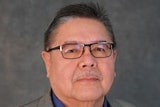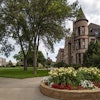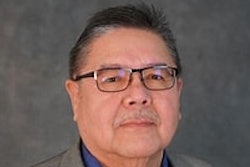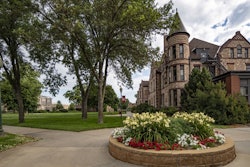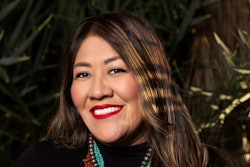Pointing to a new, 22,000-square foot administrative and classroom facility on the Okmulgee, Okla., campus of the College of the Muscogee Nation, Robert Bible is candid: “We wouldn’t have this building if it weren’t for gaming revenue.” The structure, unveiled late last year, cost approximately $7.5 million to complete, of which Bible says about $800,000 came from the U.S. Department of Housing and Urban Development and another $725,000 came via the U.S. Department of Energy.
“But the rest all came from the gaming revenue that the Creek Nation allotted to us,” he says. “Our college is officially funded by the Creek Nation. Their gaming revenue goes into an account, and from that they fund us. Indian gaming has proven to be a very good thing for all students in Oklahoma, but particularly tribal college students.”
Indian gaming in Oklahoma also has proven to be remarkably popular, even in the face of the national recession. The Creek Nation operates several casinos in the state, the main one being the River Spirit in Tulsa. According to the Indian Gaming Industry Report, tribal casino revenue in Oklahoma grew by nearly 7 percent in 2009 — the most recent year for which statistics are available — reaching a record $3.1 billion in profits. That contrasts dramatically with the national picture, which saw tribal gaming revenue decline by 1 percent, from $26.7 billion in 2008 to $26.4 billion in 2009.
“The performance of any gaming varies depending upon the state and tribe, individual facilities and the different kind of marketing that they may do,” says Dr. Alan P. Meister, the author of the report and an economist with Nathan Associates in Southern California.
“In Oklahoma, they have really upped the quality of their facilities in the last several years,” continues Meister. He recalls that, when he first began compiling his gaming report a decade ago, “There were a lot of small gaming facilities, and many were convenience stores and tobacco stores, truck stops, gas stations and restaurants.”
But now Indian gaming in the state also means the 300,000-square-foot WinStar World Casino, owned and operated by the Chickasaw Nation; the 110,000-square foot Choctaw Durant Casino Resort, run by the Choctaw Nation; and the 110,000-square-foot, Cherokee Nation-run Hard Rock Casino Tulsa. There were 111 Indian gaming facilities in the state in 2009, operated by 39 tribal nations. California was second with 66 Indian casinos.
The casinos also are adding non-gambling revenue sources like luxury hotels, restaurants and bars. In 2009, these additional businesses brought in $442 million, a 12 percent increase over 2008.
“These are amenities that weren’t thought of before,” says Meister. The success of the casinos has meant more than $100 million a year in revenue for Oklahoma’s public school system.
“It is working out exactly as we hoped,” says Clay Pope, who 10 years ago was the chairman of the House Revenue and Taxation Committee in Oklahoma and ushered through the Legislature the bill legalizing Indian gaming.
“We thought back then that there was a tremendous potential for this kind of gaming in the state, what with our geographic location and the lack of gaming in surrounding states,” says Pope, who is now the executive director of the Oklahoma Association of Conservation Districts.
“There was a good deal of talk regarding the fact that the tribes obviously had the right to do gaming based upon their sovereign status as nations,” he adds. “But the tribes wanted legal clarity regarding what type of gaming was allowed, and they got that with our legislation. When you think about it, how many times does an entity come to you and say ‘We want you to tax us, we want you to regulate us, and we want to partner with the state.’”
Pope recalls having to convince some reluctant legislators that legalizing tribal casinos would benefit the state as a whole. He says the casino-derived boost to education funding helped make the case.
“It has worked wonders, not just in terms of the revenue these casinos have brought to the state, but also the benefits to Indian Country in terms of the dollars that have gone back into health care and economic development,” Pope says. Oklahoma is home to four tribal colleges: the College of the Muscogee Nation, Comanche Nation College, Pawnee Nation College and Cheyenne- Arapaho Tribal College.
Ironically, the additional funding generated from Indian casinos goes to virtually every public education institution except the tribal colleges.
“The monies have to go to the tribes first and then some of that, through the state fee, goes to schools and teachers’ funds in Oklahoma,” says Joe Bunch, the vice chairman of the Oklahoma Gaming Association. “But, looking at the state legislation, there is actually nothing specifically set aside for the tribal colleges. Each tribe makes its own judgment on that score. They can donate to their own colleges if they wish, and they can donate any amount they choose.”
That arrangement has left some tribal college leaders feeling uneasy, especially because tribal allocations can make or break a school. Comanche Nation College, for example, gets more than 90 percent of its operating budget from the Nation.
“The Comanche Nation does give us an appropriation for our college,” says Consuela Lopez, the president of Comanche Nation College. “The Nation has a resolution and charter to establish our college, so therefore their commitment is in writing, but the exact amount of money we get could easily go up or down any given year depending upon the priorities of the tribe.”
Todd Fuller, president of Pawnee Nation College, says his school receives a portion of the revenue generated by Pawnee’s casinos, the Stone Wolf Casino & Grill and the Trading Post Casino. Fuller says he is concerned that tribal colleges are excluded from the casinos’ mandatory state contributions. Opponents point out that the automatic payments are meant to fund the state’s public education system and that tribal colleges are technically classified as private institutions. Fuller rejects that argument, pointing out that the colleges are also defined as “Land Grant” institutions, allowing them to receive funding from the U.S. Department of Agriculture and other government sources.
Even as the funding debates continue at the state level, Indian casinos and tribal colleges appear to be growing ever more entwined. According to Bible, the College of the Muskogee Nation offers most of its classes at its Okmulgee campus, but some courses are held at the River Spirit and Eastern Shawnee casinos. The school is currently in negotiations to offer classes at a few other tribal casinos as well. College courses held in casinos could seem an odd match, but, as Bible points out, in many cases it’s more akin to on-the-job training. Of the college’s 170 students, 43 are majoring in gaming, the third-most popular of the college’s four majors, behind tribal services and Native American studies. “Our budget this year, funded through gaming, is about $2.3 million,” he says.
“At the same time, we offer four degrees, one of which is in gaming. The River Spirit has a management program that requires their trainees to take our courses. This is working out for us.”
